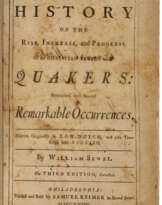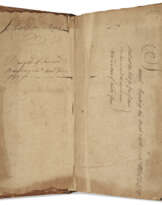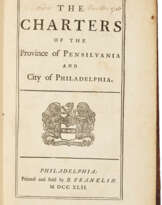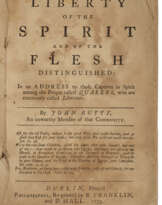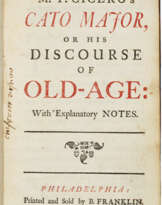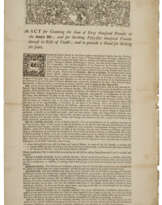ID 887917
Лот 139 | Paraphrasing Poor Richard
Оценочная стоимость
$ 10 000 – 15 000
One page, 328 x 203mm (light chipping and minor losses at margins, mostly infilled).
Invoking a maxim from Poor Richard, Franklin offers an apology for being unable to see his correspondent: "He that has much Business needs much Pardon." Franklin delicately acknowledges his correspondent's "Reproof" for failing to "wait on you when you were in Philadelphia." Citing the intrusion of the "many Affairs," both "publick and private," that consumed his schedule, he excused himself by deftly invoking the words of his alter ego, Richard Saunders. Assuming that his disappointed correspondent appreciated how burdensome Franklin's schedule was, then they "must feel experientially the Truth of that Saying, He that has much Business needs much Pardon." Franklin adds that it is generally known among his friends, that no one in his station "entertains more Strangers or with more Pleasure than I do; but I was sometimes so taken up, that I was oblig'd to postpone my Intentions of Visiting you; and at other times when I was more at Liberty, I understood you were gone to Maryland, or N. England…" concluding, disarmingly, "so that my not having the pleasure of seeing you; was not so much my Fault as my Misfortune." He closes with assurances that although our mutual "Friend is gone; his Recommendation of you is still in force with me, as I shall manifest if Occasion ever offers of doing you any good Offices. In the mean time, I thank you for your Admonition, and for your friendly Intentions of serving one in the present Affair."
Franklin first published the maxim in 1749 as: "Those that have much Business must have much Pardon" (See Poor Richard improved: Being an Almanack and Ephemeris … for the Year of our Lord 1750. (Philadelphia, [1749]). Interestingly, but not surprisingly, Franklin does not credit himself as the author of the Poor Richard maxim in the letter. (In composing the writings of Poor Richard, Franklin freely borrowed from numerous sources.) Yet his use of those sayings in his everyday correspondence appears limited—at least when gauged by what has appeared at auction. A search of Rare Book Hub has yet to reveal another letter in which Franklin employs such a near direct quote of one of Richard Saunders' published sayings. However, Franklin was known to take on the guise of Poor Richard in occasional letters, most prominently in a 9 August 1773 autograph letter signed offering advice to a young woman (Christie's, New York, 15 December 2005, lot 230, $28,800). Not published currently in The Papers of Benjamin Franklin. A search of published incoming correspondence to Franklin during this period has yet to reveal any clues on the identity of his correspondent. But the letter suggests strongly that the two had never met in person up to that time. More extensive research may yet reveal their identity
| Автор: | Бенджамин Франклин (1706 - 1790) |
|---|---|
| Место происхождения: | США |
| Категория аукционного дома: | Письма, документы и рукописи |
| Автор: | Бенджамин Франклин (1706 - 1790) |
|---|---|
| Место происхождения: | США |
| Категория аукционного дома: | Письма, документы и рукописи |
| Адрес торгов |
CHRISTIE'S 8 King Street, St. James's SW1Y 6QT London Великобритания | |
|---|---|---|
| Предосмотр |
| |
| Телефон | +44 (0)20 7839 9060 | |
| Комиссия | see on Website | |
| Условия использования | Условия использования |


